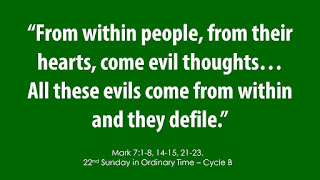Holy Gospel of Jesus Christ according to Saint Mark 9:38-43, 45, 47-48.
At that time, John said to Jesus,
"Teacher, we saw someone driving out demons in your name,
and we tried to prevent him because he does not follow us."
Jesus replied, "Do not prevent him.
There is no one who performs a mighty deed in my name
who can at the same time speak ill of me.
For whoever is not against us is for us.
Anyone who gives you a cup of water to drink
because you belong to Christ,
amen, I say to you, will surely not lose his reward.
"Whoever causes one of these little ones who believe in me to sin,
it would be better for him if a great millstone
were put around his neck
and he were thrown into the sea.
If your hand causes you to sin, cut it off.
It is better for you to enter into life maimed
than with two hands to go into Gehenna,
into the unquenchable fire.
And if your foot causes you to sin, cut if off.
It is better for you to enter into life crippled
than with two feet to be thrown into Gehenna.
And if your eye causes you to sin, pluck it out.
Better for you to enter into the kingdom of God with one eye
than with two eyes to be thrown into Gehenna,
where 'their worm does not die, and the fire is not quenched.'"
"Teacher, we saw someone driving out demons in your name,
and we tried to prevent him because he does not follow us."
Jesus replied, "Do not prevent him.
There is no one who performs a mighty deed in my name
who can at the same time speak ill of me.
For whoever is not against us is for us.
Anyone who gives you a cup of water to drink
because you belong to Christ,
amen, I say to you, will surely not lose his reward.
"Whoever causes one of these little ones who believe in me to sin,
it would be better for him if a great millstone
were put around his neck
and he were thrown into the sea.
If your hand causes you to sin, cut it off.
It is better for you to enter into life maimed
than with two hands to go into Gehenna,
into the unquenchable fire.
And if your foot causes you to sin, cut if off.
It is better for you to enter into life crippled
than with two feet to be thrown into Gehenna.
And if your eye causes you to sin, pluck it out.
Better for you to enter into the kingdom of God with one eye
than with two eyes to be thrown into Gehenna,
where 'their worm does not die, and the fire is not quenched.'"
---
A tribal mentality runs the risk of alienating others just because they are different from us. The disciples thought that they were an exclusive club of disciples empowered by Jesus. Jesus reminded them that the work of God is bigger than human associations. God works through all and in all, and transcends human boundaries. After all, the Spirit, like the wind, goes wherever it wills.
God works and saves humanity in its wholeness. He relates to each one of us regardless of color, gender, age, shape, or size. His working hand does not splinter into the diversity of humankind, but unites them in His Son. Though different, all of us are united in One Faith in Jesus. In the same way that the diverse is united in one, so must each member be singular in his own discipleship.
As individual Christians, we are called to unity not only with others but above all ourselves. Christian discipleship is a single-hearted act. Not one part of us should withheld our full communion in Jesus. We all belong to Christ, different though we are. We all belong to Christ, in all that we are.
God works and saves humanity in its wholeness. He relates to each one of us regardless of color, gender, age, shape, or size. His working hand does not splinter into the diversity of humankind, but unites them in His Son. Though different, all of us are united in One Faith in Jesus. In the same way that the diverse is united in one, so must each member be singular in his own discipleship.
As individual Christians, we are called to unity not only with others but above all ourselves. Christian discipleship is a single-hearted act. Not one part of us should withheld our full communion in Jesus. We all belong to Christ, different though we are. We all belong to Christ, in all that we are.






